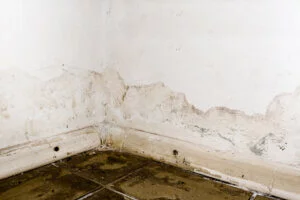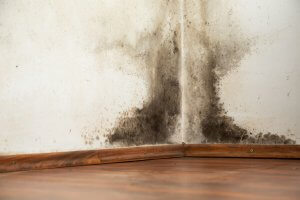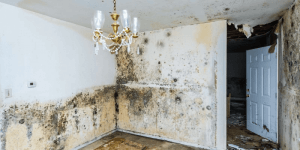Housing Disrepair Claims
Leading Housing Disrepair Lawyers London
Osbornes Law know how to win housing disrepair claims for our clients. We understand how frustrating it can be living with housing disrepair and poor housing conditions, and the impact it has can have on your daily life. Read on to find out how our housing disrepair lawyers can help you today.
Housing disrepair advice from Osbornes Law
In most tenancies repairing obligations are implied into the terms of the tenancy. The repairing obligations require a landlord to keep in repair the structure and exterior of the property and keep in repair and proper working order the installations in the property for the supply of water, gas, electricity, sanitation, space heating, and heating water.
It is not possible for a landlord to contract out of their repairing obligations.
If you own a leasehold property the freeholder’s repairing obligations will be contained in the terms of your lease.
Depending upon the cause of the problems in your home we may be able to bring a claim in the County Court seeking an order for repairs to be complete, as well as seeking financial compensation. Alternatively, in some situations proceedings can be brought in the Magistrates Court in relation to housing disrepair claims.
Specialist housing disrepair solicitors
Our team of specialist housing solicitors is one of the largest in London. We specialise in helping people who are living in unsatisfactory housing conditions bring a claim for housing disrepair. We have successfully brought claims against local authorities, housing associations and private landlords. Our housing disrepair lawyers are part of a limited number of firms in London and England who are recognised as specialising in housing issues, in the leading legal guide, The Legal 500 and Chambers UK.
What you can expect from our lawyers
When you contact us we will ask you for details of the housing disrepair issues that you are dealing with. We will also ask you for details of your tenancy. In some instances we may ask you to take pictures of the damage in your home. Once we have gathered the relevant initial information we will be able to let you know whether you can bring a claim for housing disrepair. We will also discuss funding options available to you.
Housing Disrepair Case Studies & InsightsVIEW ALL
- 2.4.2025
Significant Damages Secured in Disrepair Case
Significant Damages for Disrepair secured following breach of Court Order Our client approached Osbornes Law having previously brought a disrepair...
Read more - 28.9.2023
Disrepair Claim for Single Father
Background to the Claim Osbornes Law represented a private tenant, a single father living with his young son in their...
Read more - 10.6.2022
Housing Disrepair Claim for Leaking Pipe
Our solicitors at Osbornes Law successfully assisted a client in resolving a severe disrepair claim involving water leaks, damp, and...
Read more - 19.8.2021
Housing Disrepair Mitcham, South London
Awful housing conditions Following an investigation by ITV nearly 500 homes in the Eastfields Estate in Mitcham, south London, owned by...
Read more - 15.8.2021
Housing Disrepair Due To Persistent Dampness
Serious disrepair issues Our solicitors at Osbornes Law have successfully settled a disrepair claim on behalf of a local authority...
Read more - 22.12.2020
Housing Disrepair Claim for Disabled Tenant
Background to the Case Osbornes Law were instructed by a disabled tenant who had been decanted from her temporary accommodation...
Read more - 15.9.2020
Housing Disrepair Against Local Authority
Successful Claim of Disrepair Against Local Authority Osbornes Law, has successfully settled a significant housing disrepair claim on behalf of...
Read more - 30.3.2020
I have a disrepair issue can I withhold...
Withholding rent is not your best course of action I see the logic in using the non-payment of rent as...
Read more - 21.2.2020
Fitness for Human Habitation Act 2018
Understanding the Fitness for Human Habitation Act 2018: Your Rights as a Tenant “Home is a safe haven and a comfort...
Read more - 15.10.2019
Housing Disrepair Claim in Notting Hill
Successful settlement of Housing Disrepair Claim William Ford, a partner in Osbornes Law’s Housing and Social Care Department, has...
Read more - 20.6.2019
Housing Disrepair Claim for Vulnerable Family
Our solicitors at Osbornes Law successfully assisted a client in resolving a challenging housing disrepair claim involving severe damp, leaks,...
Read more - 23.5.2019
Housing Disrepair Claim against Housing Association
Enforcement Proceedings issued against Housing Association Osbornes Law recently enforced a binding agreement reached with a housing association concerning much-needed...
Read more - 5.10.2018
Housing Disrepair Claim for Structural Damage
Our solicitors successfully represented a client in a disrepair claim against a landlord involving structural damage and severe damp in...
Read more
Will is the best housing solicitor there is and he has the best housing law mind I have come across. He is really exceptional and incredibly helpful for both clients and people in the sector.
They are extremely good and diligent in their work - they are super amazing.
The lawyers at Osbornes Law work with passion, putting in all their best.
Osbornes has some very good quality lawyers doing very interesting work.
Osbornes have a strong team with some truly excellent individuals.
They are tenacious, approachable, and extremely effective in representing the interests of their clients including in highly complex cases.
Osbornes Law are a truly excellent team. They cover a range of immigration, housing, and social care matters with a core commitment to representing vulnerable clients.
Osbornes has a particular strength in handling social housing challenges with a focus on homelessness and assisting children with disabilities.
William Ford has a forensic knowledge of housing law and is extremely intelligent, very thorough, and excellent with clients
Excellent communication at all stages of a claim and an emphasis on the needs of the client.
A thoroughly professional firm who have specialist knowledge of their areas of law.
Outstanding lawyers providing outstanding quality advice. They are one of the leaders in the field.
Alex McMahon is an extremely safe pair of hands for any housing issues.
William Ford has long been a leading individual in the housing law world.
Osbornes' social housing law team is very good and very well regarded within the field, with great solicitors across the full range of seniority.
The housing team at Osbornes is the best in England.
Alex McMahon is another notable team member who practices across housing law, public law, and community care.
Disrepair and possession-related cases are a key strength of Taylor.
Practice head William Ford is praised as ‘the best housing and social security lawyer in the sector.
The social housing team at Osbornes boasts extensive experience in representing clients with claims against local authorities and housing associations in mandates surrounding disrepair, possession, eviction warrants and illegal evictions, homelessness, and anti-social behaviour.
Excellent work as usual Team Osbornes Law. Our service users have experienced some of the exceptional outcomes yourselves have achieved as outcomes for their housing and social issues.
Keep up the excellent work.
Osbornes Law represents tenants in the full variety of housing law matters,
Osbornes Law are a very highly regarded firm who are at the coalface. They are very on top of their cases.
The Osbornes team is capable and responsive.
William Ford is the best housing and public law solicitor of his generation.
Osbornes are a fantastic team who really stand out in the market in the fields of housing and social care.
"The team explains things clearly, is very responsive and goes the extra step to help those who need it."
"I was impressed and grateful from the very beginning - the team are extremely detailed, very thorough, helpful and reassuring at the same time. I would absolutely recommend Osbornes Law."
"Osbornes Law is efficient and focused, and clearly prioritises the client's interests."
William Ford is experienced in representing tenants in disrepair and possession claims, as well as homelessness appeals and judicial reviews concerning allocation of housing.
‘Osbornes are very approachable; in a time where many firms are unwilling to take on cases that do not look promising, they are prepared to look at difficult situations and find a way to assist their clients.
"Osbornes is one of the firms that I consistently recommend. Excellent service, and thorough and knowledgable lawyers."
‘From the very first moment, I was aware and grateful to have been put in touch with Osbornes. The expertise, advice, leaving no stone unturned right from the first minute until the very last, I would most certainly recommend every single time.’
"The associates have a thorough knowledge of the area of law, communicate effectively and are incredibly easy to work with."
"They are a firm that likes a challenge and are prepared to do the groundwork to develop cases, even if it means much preparation without remuneration."
"It is clear the firm put the interests of the client first at all times."
"There’s a real sense of team ethic. It’s clear that internal communication and case recording are strong because if a solicitor handling a case is away the person covering is fully up to speed, has the necessary documents available to them and nothing falls through the cracks."
"If a short deadline comes up on an urgent case, solicitors are active in collaborating to ensure it can be met."
"The practice is ‘undoubtedly one of the best in the business‘ and has a strong reputation for complex disrepair cases and possession claims against local authorities and housing associations."
Very strong team – incredibly knowledgable with good cross-over knowledge in mental capacity and community care. Thorough, dedicated and very professional. Clients will feel they are getting a gold standard service.
"Osbornes are an exceptional team. They have a wealth of housing experience and knowledge that is ‘top notch’. Clients are safe in their hands. As colleagues, they have a fantastic working relationship with each other and, feeding off of each other’s expert knowledge, their solicitors work to ensure that no stone is unturned."
"The team at Osbornes is inspired by its leader Will Ford, a truly first-rate, modern lawyer’s lawyer. The team have blossomed under his Will and are now packed with conscientious, dedicated and excellent lawyers who always give their clients 100%."
"Alex McMahon – thorough and committed. Very easy to work with."
"William Ford - A good technical lawyer with a strong commitment to his clients"
"A committed and well-organised team with a good knowledge of the law and who work hard to secure a good outcome for their clients"
"Osbornes has an impressive social housing team and the quality of their work that I have seen is very high. Will Ford is a very well-regarded figure in the housing law world and leads a team of high quality and committed lawyers."
"Osbornes provide an incredibly high-quality service to their clients. The firm treats its legal aid clients with the same respect and commitment as if they were important private clients, which is rare and admirable. Their housing solicitors are also highly skilled and knowledgable."
"He goes the extra mile for his clients."
"He is an excellent lawyer with exceptional attention to detail. He leaves no stone unturned in finding the right solution for his clients."
"This is an outstanding firm with great attention to detail. They work tirelessly to achieve the best possible outcome for their clients. They have excellent client care skills and are extremely organised."
“Osbornes has an impressive social housing team and the quality of their work that I have seen is very high. Will Ford is a very well-regarded figure in the housing law world and leads a team of high quality and committed lawyers. The existence of family and property law teams at the firm, amongst others, means that they are able to offer a holistic and expert approach to their clients.”
William Ford is "highly committed to his clients and leaves no stone unturned in seeking to assist them with their problems"
William Ford "is an astute litigator, and his breadth of knowledge allows him to take a holistic approach to clients’ situations."
"They are at the forefront of legal developments in the field of social housing and community care. They are committed to using their multidisciplinary expertise to achieve the best possible outcomes for clients."
"This a great team - the quality of their work is amazing and they are very professional"
"An exceptional outfit. They take on difficult cases, fight hard and win."
"William Ford frequently represents tenants in possession proceedings, homelessness appeals and disrepair claims... and is praised for his dynamic and hard-working approach."
"Osbornes team is noted for cross-practice expertise in areas such as housing and community care, which it brings to bear in disrepair, possession and homelessness cases involving vulnerable adults, individuals with language difficulties, the elderly and those with no recourse to public funds."
"The absolutely brilliant William Ford."
I was very happy with the excellent service from Osbornes in my disrepair case. They obtained a great result in my case and always pushed hard for my rights.
The social housing team is friendly, approachable and genuinely care about its clients.
A broad knowledge places the social housing department one step ahead of others when it comes to community care knowledge.
The social housing department always go the extra mile.
The social housing team has a strong track record in representing tenants in claims against local authorities and housing associations, with particular expertise in complex disrepair and possession cases.
The social housing department provides an excellent service and is able to react quickly in critical situations.
Thanks for all your support during this very difficult time for my family.
William Ford receives effusive praise for his dedication and commitment to social housing. Interviewees highlight his technical understanding and background in housing law, and describe him as highly impressive."
The team understand vulnerable clients and young people, and on the front line they are prompt and efficient.
Edward Taylor undertook my case from an almost unwinnable position. From our first meeting, Edward's enthusiasm was apparent. He was determined, diligent and most professional when dealing with my case, keeping me informed at every stage. I wholeheartedly thank Edward for his endeavours and would not hesitate in recommending him and Osbornes Solicitors to others.
Osbornes Solicitors give us the confidence and strength to continue and input the belief that the case would turn in our favour … What was most important was the transparency in communication that Osbornes provided.
Osbornes Solicitors are the pinnacle of professionalism and have gone beyond to assist with this case … I felt that I wasn't only dealing with just one dedicated solicitor but I had a good knowledgeable team behind me at all times.
I have been extremely impressed with the level of patience and guidance provided in the case … I would like to thank you for your sympathetic approach and understanding towards my mother’s case and I would strongly recommend Osbornes Solicitors to anybody.
'First-class lawyer' William Ford is 'completely dedicated to making a positive difference', and is acting in cases challenging the 'bedroom tax'.
Osbornes is commended for its 'rare level of commitment'.
William acts on possession, disrepair and homelessness cases, and has particular expertise in the protection of tenancy deposits under the Housing Act 2004
Housing Disrepair FAQs
Who can I make a housing disrepair claim against?
1. Private Landlords
- Private individuals or companies who own properties and rent them out to tenants. Tenants in private rental accommodation can claim disrepair if their landlord fails to carry out necessary repairs.
2. Housing Associations
- Tenants living in properties owned by housing associations can make disrepair claims if their landlord does not fulfill their legal responsibilities for property maintenance.
3. Local Councils (Council Housing)
- Tenants in council-owned housing can also claim disrepair if their council fails to carry out essential repairs. This applies to properties managed by the local authority or outsourced management companies working on behalf of the council.
4. Social Housing Providers
- Social housing landlords, which may include non-profit organisations that provide affordable housing, are responsible for keeping their properties in good condition. Tenants can claim disrepair if this is neglected.
What issues can I claim housing disrepair for?
Common grounds for a disrepair claim include:
- Damp and mould
- Leaks or flooding
- Structural issues (e.g., cracks in walls)
- Heating or hot water system failures
- Faulty plumbing, electrics, or gas
- Inadequate safety measures (e.g., fire alarms, locks)
In all cases, tenants should first notify their landlord of the repair issue and allow reasonable time for it to be fixed before pursuing a legal claim for disrepair.
Do your housing disrepair solicitors offer no win no fee?
Our housing disrepair solicitors offer no win no fee agreements also known as Conditional Fee Agreements (“CFAs”) in certain circumstances.
We retain discretion over whether to act under a no win no fee agreement and we cannot guarantee that this form of funding will be available in all cases. A decision upon whether to act under a no win no fee agreement will be taken following a risk assessment to ensure that the particular case is suitable for this type of funding.
If you win your case, you may have to pay a ’success fee’ and any insurance premium out of your compensation. You will also be liable to pay the costs incurred in the case, but Osbornes Law will seek to recover these costs from your opponent, as the winning party is normally awarded their legal costs against the losing party.
If your case is lost, Osbornes Law will not be paid for the work we have done on your case. You may be able to obtain what is known as ‘after the event’ insurance to cover the risk of you having to pay your opponent’s costs in the event that you lose your case.
What is penetrating damp?
Damp occurs when the housing disrepair in the structure of the building allows water to enter the building from the outside. Penetrating damp is usually caused by structural problems in the building such as faulty guttering or roofing which your landlord/freeholder is usually responsible for maintaining.
Are there things you cannot bring a housing disrepair claim for?
You can only bring a disrepair claim for damage to your home where that damage has been caused by disrepair. If the problem arises from an inherent defect in the property which is not caused by disrepair, then this is not something for which you can bring a housing disrepair claim. However, you may be able to bring a claim under The Homes (Fitness for Human Habitation) Act 2018, which is discussed below, or under environmental health legislation.
What is condensation based damp?
This is where the dampness in your home is not caused by water penetrating from outside but arises due to the conditions in your home. This may be due to a lack of ventilation or poor design. Condensation dampness does not occur due to disrepair, and would not form part of a claim for disrepair. However, it may be possible to bring a claim under The Homes (Fitness for Human Habitation) Act 2018, which is discussed below, or under environmental health legislation.
What is the meaning of the term ‘fitness for habitation’?
The Homes (Fitness for Human Habitation) Act 2018 came into force on 20 March 2019. The Act applies to new tenancies, of less than 7 years, granted on or after 20 March 2019 (but will apply to all such tenancies after 20 March 2020). The Act requires that a property that is rented is: (a) Fit for human habitation at the time the lease is granted or otherwise created or, if later, at the beginning of the term of the lease, and (b) Will remain fit for human habitation during the term of the lease. In considering whether or not a home is unfit for human habitation, the following will be considered: repair, stability, freedom from damp, internal arrangement, natural lighting, ventilation, water supply, drainage and sanitary conveniences, facilities for preparation and cooking of food and for the disposal of waste water; in relation to a dwelling in England, any prescribed hazard; A house will be considered to be unfit for human habitation if one of more of the above apply and it is not reasonable for someone to occupy the house in the condition that it is in.
Notifying your landlord of housing disrepair
If there are problems with housing disrepair you must bring this to the attention of your landlord by providing notice. Below are a list of helpful steps you should take prior to contacting a lawyer:
- You should always aim to notify your landlord in writing where possible so that you have a written record of notice having been provided.
- You should keep clear records of what the problems at your property are, when they arose, and when you notified you landlord of them.
- If the problem is not resolved promptly it is also likely to be worth contacting your local authority (if they are not also your landlord). The Council has powers to serve various notices in relation to conditions in your home.
- You should always provide access to your landlord to inspect the property and to carry out repairs. A failure to provide access will be a defence to any housing disrepair claims.

















